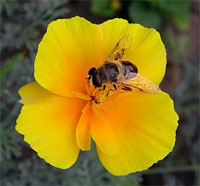|
Clinical
Specialties: Apitherapy
About Bee
Venom Therapy
 Bee
Venom Therapy Bee
Venom Therapy
Bee venom has a long tradition as a folk remedy
for arthritis and other degenerative diseases.
As in the case of many natural folk treatments
used for millennia throughout the world, bee
venom contains active compounds that have therapeutic
properties. Just as myriad plants have given
humankind some of our most valuable pharmaceutical
drugs, many of the bioactive ingredients in bee
venom are a treasured, but little known, part
of Nature's pharmacy.
Bee venom is administered by properly trained
physicians in the form of a direct bee sting
or an injection of the sterile venom from a bottle.
In several studies, including research conducted
by Andrew Kochan MD, bee venom therapy was successful
in treating diseases which conventional pharmaceuticals
can only partly help. Bee venom has potent analgesic
and immuno-modulatory properties that help reduce
inflammation and promote healing. It also contains
several anti-inflammatory compounds including
melittin and adolapin.
Medical researchers in Russia reported that
bee venom helped restore the normal function
of the endocrine system in human patients. Other
studies reveal that melittin stimulates the endocrine
system to produce the body's own cortisone-like,
anti-inflammatory substance. Melittin is a peptide
that appears to be more powerful than hydrocortisone
in decreasing inflammation. It is free of the
serious side effects linked with hydrocortisone.
A November 2004 article published in the journal
Arthritis and Rheumatism explores the mechanism
of this anti-inflammatory property of Melittin.
The growing list of therapeutic benefits and
overall safety profile of bee venom therapy have
made it one of the most remarkable complementary
treatments currently available for relieving
intractable pain.
Preliminary case studies suggest that
bee venom may improve symptoms of:
- Rheumatoid Arthitis
- Gout
- Osteoarthritis
- Bursitis
- Tendonitis
- Post herpetic neuralgia
- Painful or keloid scars
- Multiple Sclerosis
- Fibromyalgia
- Chronic fatigue syndrome
How Is Bee Venom Therapy Administered?
Bee venom therapy is the most specialized form
of apitherapy and requires the expertise of a
skillfully trained practitioner such as Dr. Kochan.
Before starting treatment, Dr. Kochan first tests
each patient for an allergic response to bee
venom. Allergies are quite rare and occur in
only one out of every 100 people in the general
population. Bee venom treatments are given twice
a week on average, and patients usually report
some improvement within two to three treatments.
Dr. Kochan's patients who receive bee venom therapy
are also given a personalized nutrition plan
that is specially designed to help support their
immune system.
Wnt to know more
For additional information or consent
form and aftercare
instructions see this section
|

